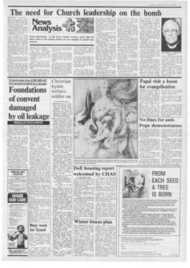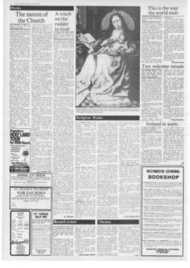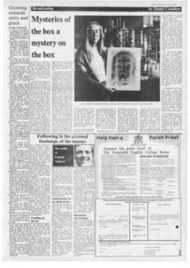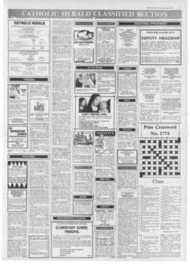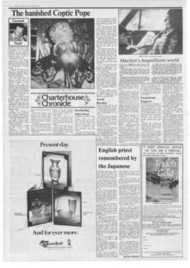Page 6, 12th November 1982
Page 6

Report an error
Noticed an error on this page?If you've noticed an error in this article please click here to report it.
Tags
Share
Related articles
New Paperbacks
Risking Pain For Enlightenment
Religious Round Up
Literary Lights In Liverpool
Extracts From Cardinal's Book
Religious Books
An Unfading Vision: The adventure of books: by Edward
England (Hodder and Stoughton. £1.75) is as interesting as a thriller. It gives an insight into the world of publishing.
It is the autobiography of a man whose life has been dedicated so far to the publication of books. We learn much about interesting aspects of such authors as C S Lewis, J B Phillips and William Barclay.
The author found himself publicly disassociating himself from one of his firm's title's, what he describes as "an unfortunate publication by John Allegro entitled The Sacred Mushroom and the Cross.
He was the newly promoted editor in charge of all religious publishing at the time. He describes the episode as a bizarre story. Mr England's book is a captivating adventure in reading.
Beyond Biblical criticism by Arthur Wainwright (SPCK £3.95) has the sub-title "Encountering Jesus in Scripture." This latter is a far more accurate guide to the book. While the author shows, quite accidentally in the course of the book that he has a scholarly knowledge of the works of writers, critics and experts on the Bible, his aim is simply to persuade us to take up our scriptures and find Jesus there.
It is a Christocentric book for spiritual reading rather than for study, in which he urges us to view everything in the Bible through the eyes of Jesus.
Lifelines: The Ten Commandments for Today by Edith Schaeffer. (Hodder and Stoughton: £4.50 consists of ten chapters, preceded by an introduction, and as the title headings are simply: "The First Commandment" "The Second Commandment" on up to the tenth, I found, as a Catholic, the book more than somewhat confusing. If the wording of the commandment had been added as a subheading to the chapters it would have been a useful guide.
The problem was confusion more confused due to the entering of each chapter in an illustrative, informal manner that does not indicate what the commandment is about. We are so apt to talk about the fifth commandment as "Thou shalt not kill– and the sixth "Thou shalt not commit adultery" that we forget that other Christians use a different numbering.
I am glad to praise a book about the commandments application in today's world by a writer who does this well.
Prophesy by Peter Southwell (Hodder and Stoughton: £4.50) is a book about the Old Testament that is a very genuine help to understanding of the new.
In just over a hundred pages it helps us to understand what prophesy really means, who the great Old Testament prophets were, and what their message was. People who imagine it concerns foretelling the future will be deeply disappointed, although providentially they might be led on to an understanding of the Old and then to the New Testament.
Good News of God by E M Sidebottom (Darton, Longman and Todd: £5.95) makes it clear that the gospel is not only good news from God but good news of God, both as to his nature and his character.
The central theme of the whole gospel and all the gospels is that God so loved that he gave. The thoroughgoing goodness of God is the central motif of the gospels and the clue to their understanding.
The essence of the gospel is that God is goodness itself. Opposition in the main to new rites in church is often to lack of beauty and dignity, but, says the author, it is really to the emphasis now on God's love and grace; and to leave out God's love and grace is to emasculate the gospel.
The distinctive ethical teaching of the Gospel is derived from the goodness of God. You are imitators of God, so you should be imitators of Christ, who gave us the new commandment of love, but who did not supinely give in to enemies, who spoke against hypocrites who rob widows, and retorted when struck.
So, I quote the author's exact words: "The present Cardinal Archbishop of Westminster, Basil Hume, has protested that even to threaten the mass murder of millions of human being is wrong, and the Archbishop of Canterbury, Robert Runcie, has agreed with him."
What a fine book to read and meditate on again and again.
Living Alone: The Inward Journey to Fellowship by Martin Israel (SPCK £3.95) is in the series "The New Library of Pastoral Care. The library exists because today the professions of social work, counselling and psychotherapy can contribute greatly to the pastor's work.
Certainly this book on being alone and its effects is more than valuable to ministers of the gospel.
One basic experience that unites all people is an inner aloneness. There is a great difference between living alone and being alone.
To enjoy the silence of aloneness is the way to a deeper knowledge of God. Yet there are people who fear being alone and must surround themselves with friends, hustle and activity. When left suddenly alone people may learn how little cone has in common with the acquaintances who seemed to be friends.
The experience of being alone with God is the heart of a retreat.
Leo Smith SDS
blog comments powered by Disqus




